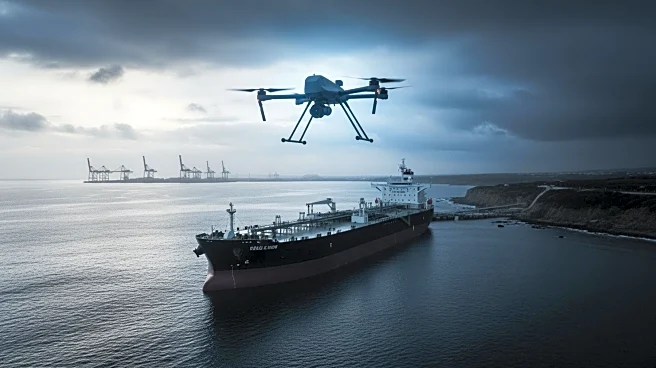What's Happening?
A Turkish-flagged tanker was struck by a drone in Ukraine's Odesa region, igniting the vessel during the offloading of liquefied petroleum gas at Izmail port. The incident occurred shortly after Ukrainian
President Volodymyr Zelenskyy signed a deal to import U.S. liquefied natural gas through the area. All 16 crew members evacuated safely, and no injuries were reported. The attack is part of ongoing Russian assaults on the Odesa region, targeting its Black Sea ports and energy infrastructure. Zelenskyy aims to secure energy imports to support Ukraine through the winter, with U.S. natural gas set to flow to Odesa via pipelines from Greece starting in January.
Why It's Important?
The drone strike highlights the vulnerability of Ukraine's critical infrastructure amidst the ongoing conflict with Russia. The deal to import U.S. liquefied natural gas is crucial for Ukraine's energy security, especially as winter approaches and Russia continues to target energy facilities. The ability to maintain energy supplies is vital for Ukraine's resilience against Russian aggression. The incident also underscores the strategic importance of the Black Sea ports for Ukraine's imports and exports, which are essential for the country's economic stability.
What's Next?
Ukraine is expected to continue strengthening its energy infrastructure and import capabilities to withstand Russian attacks. The U.S. natural gas deal is a significant step in this direction, with the first shipments anticipated in January. Regional tensions may escalate as Russia persists in its military operations targeting Ukrainian ports and energy facilities. International diplomatic efforts may intensify to support Ukraine's sovereignty and energy independence.
Beyond the Headlines
The attack on the Turkish tanker raises concerns about the safety of maritime operations in the Black Sea region. It also highlights the broader geopolitical implications of energy security in conflict zones, where infrastructure is frequently targeted. The situation may prompt further international discussions on protecting critical energy routes and ensuring stable energy supplies in war-affected areas.










